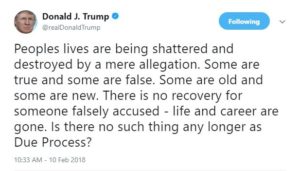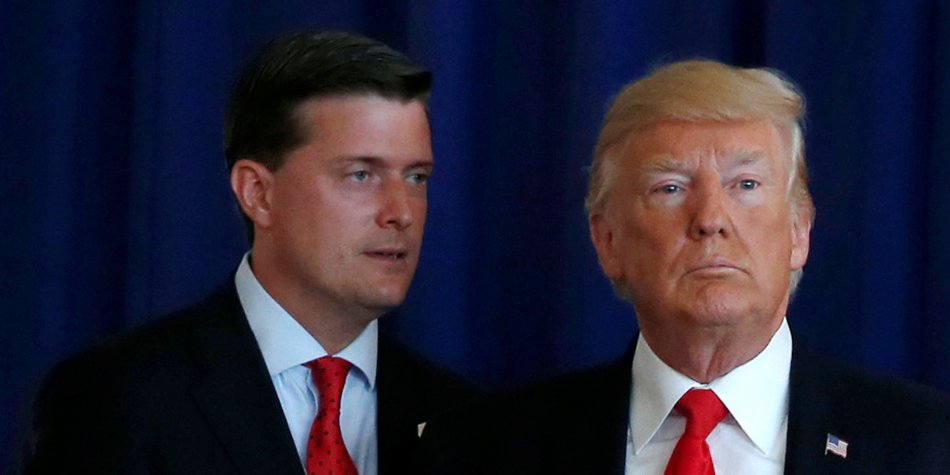From Congress’s Late-Night Budget Circus to the Rob Porter Fiasco, the Problems Begin in the Oval Office
After all the government fuss this week, we’re left trying to find some meaningful takeaways from the flood of events that might explain the behaviors involved.
From the poor handling of the Rob Porter resignation at the White House to the middle-of-the-night shenanigans at the Capitol that have left a debt-ridden budget agreement in place, we have seen a parade (There you are, Mr. President!) of selfish, self-serving, insular, don’t-ask-too-many-questions thinking.
The key questions from the late response to Rob Porter—the presidential intimate who has a history of documented domestic violence—involve not only acceptance of moral bankruptcy in the White House, but serious issues about how backgrounding and credentialing in the White House has been skewed from assuring clean records to loyalty.

That this issue arose as the #MeToo movement is cresting reflects pure shame. The whole concept is that the anger and lack of respect from private lives indeed do connect to lack of judgment in the workplace, which has played out in unwarranted sexual assault in work settings. In Porter’s case, a background check did turn up court orders and police complaints against Porter from two ex-wives. This week, it all turned public, including a photo of one of the women with a black eye from a punch by Porter.
It took news reporting rather than White House announcements to expose the thin excuses for allowing Porter to continue in office. It became clear that Porter was a confidante of the inner circle, and that those folks circled the wagons to protect him; now there are reports that Kelly himself is the subject of presidential venting and has offered to resign. Reporting clearly established that similarly, many others in the White House, including Jared Kushner, the presidential son-in-law, lack formal permanent credentials.
So, setting psychology aside, what we have is a case of people acting on protecting that with which they are familiar, even as Kelly, at least, eventually would acknowledge domestic violence as a moral no-no. To protect someone they liked, the White House leaders ignored outside fact. (Meanwhile, a second White House employee, speechwriter David Sorenson, has quit after his ex-wife made allegations of domestic abuse, saying he put a cigarette out on her hand and ran a car over her foot.)
Let’s be clear, none of this needed to happen. Porter should have fessed up; Trump, Kelly and team ought to have tossed him; they should have used “extreme vetting” on a sensitive opening to ensure a staff that based on merit, not personal connection. (Hmm, sounds a lot like what the president says about immigration. . . . )
To me, that may the most important lesson from the incident, because it also seems to apply to the Congress, the federal budget, a second government shutdown and a failure to address the immigration elephant in the room. It may also help explain the blizzard of ill-founded information being circulated in memos (on all sides) in defense of one position or another in the pursuit of the Special Counsel investigation. It may explain why, as a society, we are asked to ignore presidential dalliances with a porn star to applaud instead at the president’s appearance at a National Prayer Breakfast, or why we are asked to pay attention to a parade to honor the military rather than notice that we have no discernible military policy about staying in Afghanistan.
The connective tissue here is that this White House, and maybe all White Houses, is especially attuned to protecting what it knows, and ignoring the rest. This is a White House that professes a preference for disruption in social and governmental norms, but really has no appetite for ambiguity. In its place, this White House offers people it likes and slogans it is comfortable uttering aloud.
The meanderings of Congress—without credible presidential leadership—followed a similar pattern. Rather than focus on the problem-solving at the moment, we circuitously ended up at a budget deal that will saddle the country with an enormous deficit just as the very same lawmakers guaranteed that we will bring in less tax money because of huge corporate tax cuts. The new budget depends on the apparently courageous decision to spend a ton more tax money on the military and social programs.
In so doing, we saw a hypocrisy of Republican conservatives who vote for unfunded tax cuts while arguing for spending caps, and we saw Democrats in the House once again insist on mixing the immigration debate with budget talks. The parties are comfortable with what they know; they avoid the ambiguity of compromise. They talk slogans rather than actually try to solve problems on their merits, basing decision-making on realities.
Just as in the Porter matter, Congress has some clear moral choices in all their deliberations. But they talk about money in the abstract rather than focusing on providing certainty to federal employees, including military families, or recognizing that big deficits will result over time in more pressure on the marketplace economy, will make borrowing more difficult, and will commit more tax money to debt service, which provides nothing to the average person. At the same time, all talk of what turned out to be an hours-long government shutdown could have been dispensed just by agreeing that yes, immigration is a problem worth a debate and vote.
Maybe the president and Kelly don’t think that domestic violence is serious; after all, the president has his own issues acknowledging sexual groping charges, and the White House has backed other men, Roy Moore Jr. comes to mind, who have faced harassment allegations. Maybe Congress does want to spend less, tax less and avoid deficits. But their actions speak too, and it’s worth listening to what the actions say.
Featured Photo: Ousted aide Rob Porter with Trump (AP photo)





